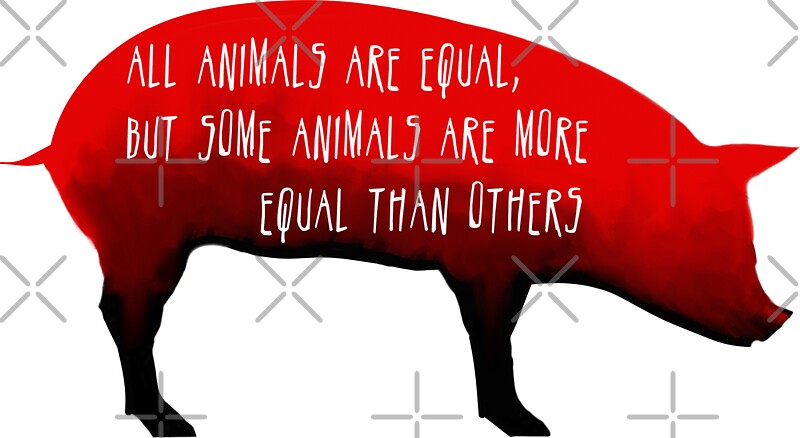Tyson interprets New Historicism as what happens when we
read a historical account and ask ourselves: “what does thus account tell us
about the political and ideological conflicts of the culture that produced and
read the account?” (Tyson 268). When New Historicism is applied to literary
texts Tyson states that these texts are often viewed as “cultural artifacts that
can tell us something about the interplay of discourses, the web of social meanings,
operating in the time and place in which the text was written” (Tyson 277). When
pondering both of these topics, the first example that came to my mind was
George Orwell’s famous novel: Animal Farm.
At first glance, Orwell’s novel seems to be about a bunch of animals who
overthrow their farmer, fight for control, and ultimately just end up in a
situation worse than what they came from. In a nutshell, that’s it; but if you
do a deeper reading of the novel and apply New Historicist thought to it, traces
of communism come out from the framework.
 When we read the novel while keeping in mind “the political
and ideological conflicts of the culture that produced” it and asking what the “interplay
of discourses” within it might be we see the plucky pig leaders, Napoleon and
Snowball in a different light. Written in 1945, a time when communism was striking
fear in the hearts of many people throughout the world, Animal farm perfectly fits into the social discourse of post WWII/Cold
war era Russia. The overthrow that the animals partake in against the humans is
often seen as parallel to the communist revolution, and the pig that starts the
revolution, Old Major, is often compared to Vladimir Lenin, the leader of the revolution
in Russia. We also see reflections of other communist Russian leaders such as
Joseph Stalin (Napoleon) and Leon Trovsky (Snowball) in the pig leaders who
take over after Old Major’s death. We slowly start to see the discourse of communist
Russia and the communist revolution play out through the characters of the
animals, something that was heavy on many people’s hearts at the time of Animal
Farm’s publication.
When we read the novel while keeping in mind “the political
and ideological conflicts of the culture that produced” it and asking what the “interplay
of discourses” within it might be we see the plucky pig leaders, Napoleon and
Snowball in a different light. Written in 1945, a time when communism was striking
fear in the hearts of many people throughout the world, Animal farm perfectly fits into the social discourse of post WWII/Cold
war era Russia. The overthrow that the animals partake in against the humans is
often seen as parallel to the communist revolution, and the pig that starts the
revolution, Old Major, is often compared to Vladimir Lenin, the leader of the revolution
in Russia. We also see reflections of other communist Russian leaders such as
Joseph Stalin (Napoleon) and Leon Trovsky (Snowball) in the pig leaders who
take over after Old Major’s death. We slowly start to see the discourse of communist
Russia and the communist revolution play out through the characters of the
animals, something that was heavy on many people’s hearts at the time of Animal
Farm’s publication.  Thus, when reading Animal
Farm with a new historicist point of view, we view it as a reflection of the
political conflicts of communism in Russia in the 1940s. We see the “web of
social meanings” in the way the pigs lead the animals in revolt, the way Napoleon
overthrows his partner snowball, and in the way he changes the “Principles of Animalism”
from their original purposes to a more sinister interpretation. By the end of
the book, one pig has taken over the whole farm, (kind of like Stalin took
over, but let’s not name names….) and the animals can’t see any difference in
their post revolution farm from the pre-revolution version. This strikes a lot
of similarities with communism at the time, because it certainly was nothing
like anyone expected it to be. Just like communism spread and overtook several
countries through one leader, the corruption of the pig Napoleon spread throughout
the farm and he banished anyone who tired to stop him. Talk about a thirst for
power. Overall, Animal Farm can be
read in a new historicist light by the way in which it reflects the communist
discourse of the time in which it was written (and takes the term "communist pigs" to a whole different level).
Thus, when reading Animal
Farm with a new historicist point of view, we view it as a reflection of the
political conflicts of communism in Russia in the 1940s. We see the “web of
social meanings” in the way the pigs lead the animals in revolt, the way Napoleon
overthrows his partner snowball, and in the way he changes the “Principles of Animalism”
from their original purposes to a more sinister interpretation. By the end of
the book, one pig has taken over the whole farm, (kind of like Stalin took
over, but let’s not name names….) and the animals can’t see any difference in
their post revolution farm from the pre-revolution version. This strikes a lot
of similarities with communism at the time, because it certainly was nothing
like anyone expected it to be. Just like communism spread and overtook several
countries through one leader, the corruption of the pig Napoleon spread throughout
the farm and he banished anyone who tired to stop him. Talk about a thirst for
power. Overall, Animal Farm can be
read in a new historicist light by the way in which it reflects the communist
discourse of the time in which it was written (and takes the term "communist pigs" to a whole different level).
No comments:
Post a Comment